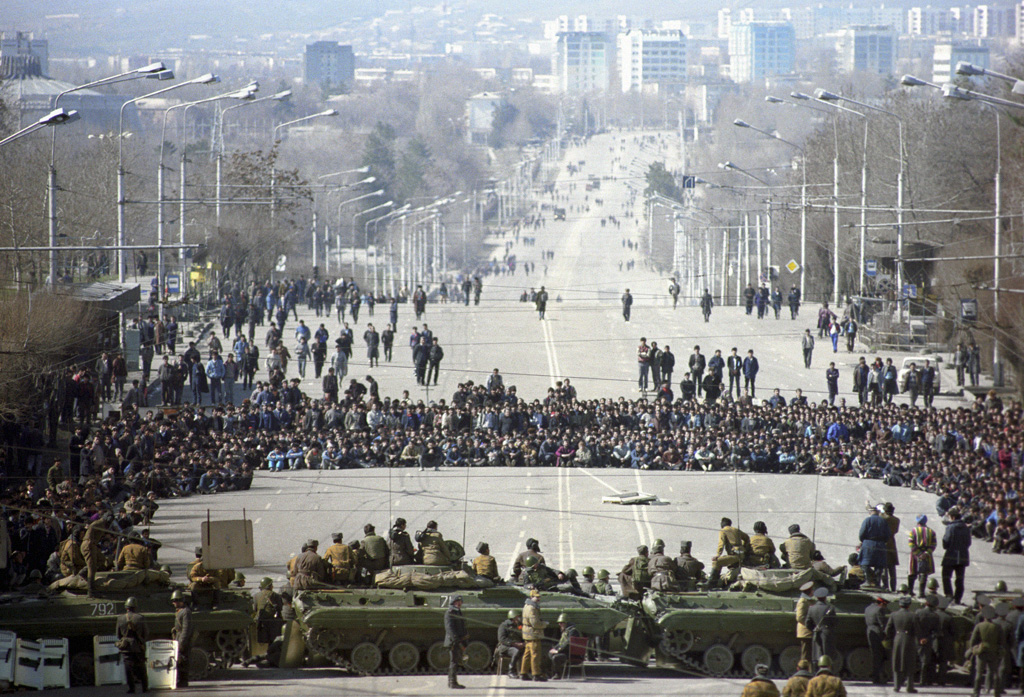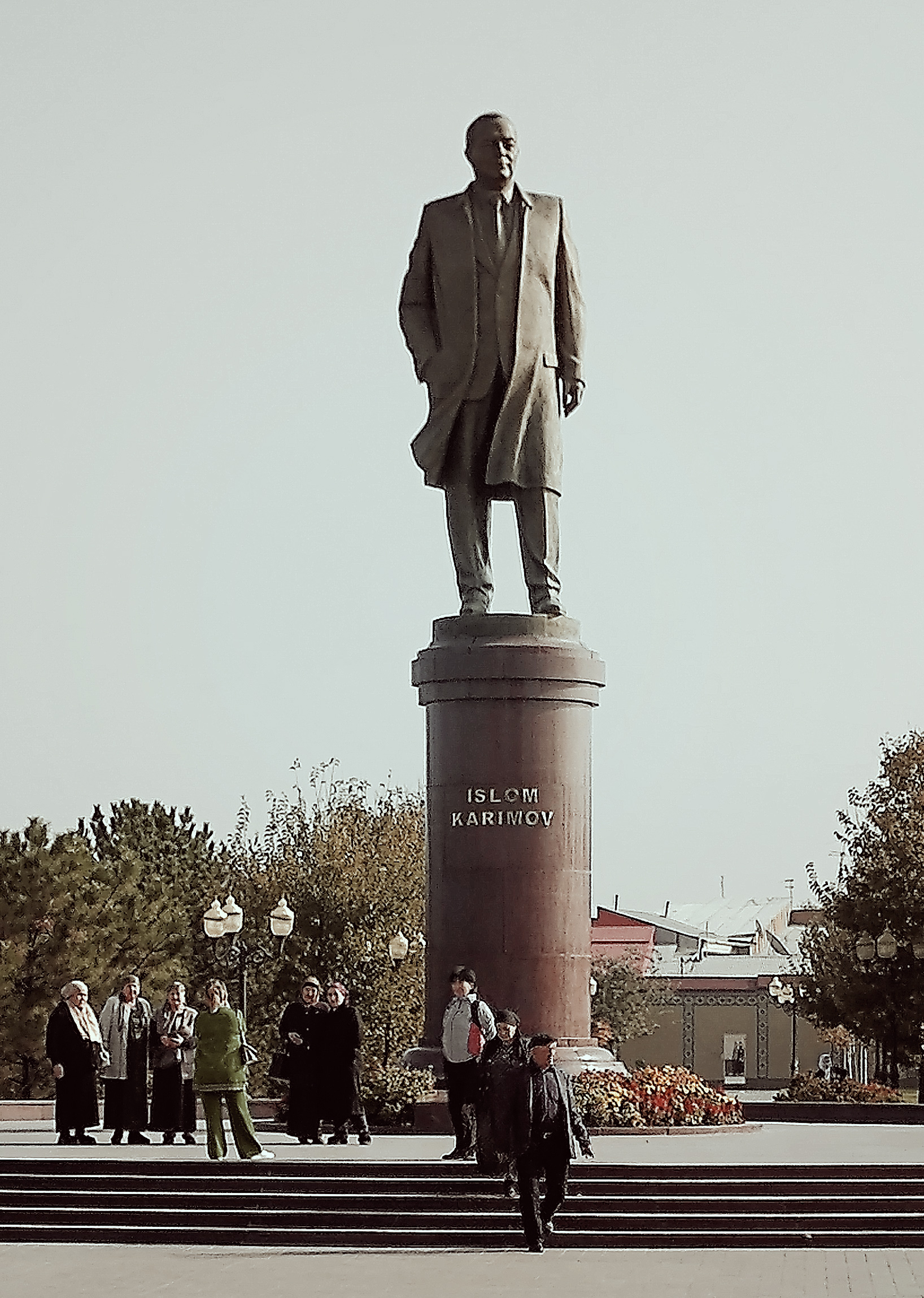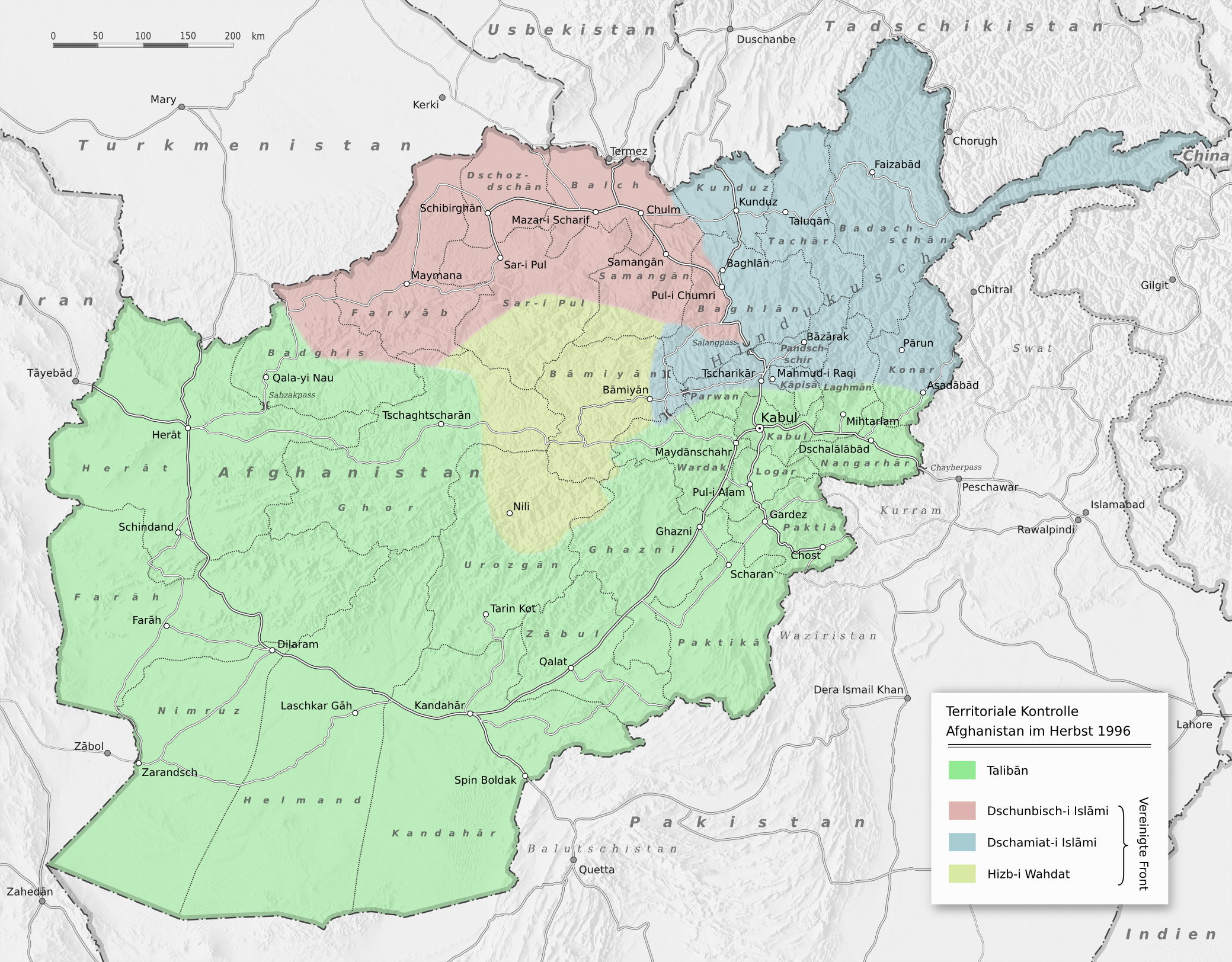|
Civil War In Tajikistan
The Tajikistani Civil War ( tg, Ҷанги шаҳрвандии Тоҷикистон, translit=Jangi shahrvandiyi Tojikiston / Çangi shahrvandiji Toçikiston; russian: Гражданская война в Таджикистане), also known as the Tajik Civil War, began in May 1992 when regional groups from the Garm and Gorno-Badakhshan regions of Tajikistan rose up against the newly formed government of President Rahmon Nabiyev, which was dominated by people from the Khujand and Kulob regions. The rebel groups were led by a combination of liberal democratic reformers and Islamists, who would later organize under the banner of the United Tajik Opposition. The government was supported by Russian military and border guards. The main zone of conflict was in the country's south, although disturbances occurred nationwide. The civil war was at its peak during its first year and continued for five years, devastating the country. An estimated 20,000 to 150,000 people were killed i ... [...More Info...] [...Related Items...] OR: [Wikipedia] [Google] [Baidu] |
Post-Soviet Conflicts
This article lists the post-Soviet conflicts; the violent political and ethnic conflicts in the countries of the Post-Soviet states, former Soviet Union following its Dissolution of the Soviet Union, dissolution in 1991. Some of these conflicts such as the 1993 Russian constitutional crisis or the 2013 Euromaidan protests in Ukraine were due to political crises in the successor states. Others involved separatist movements attempting to break away from one of the successor states. Frozen conflicts Some post-Soviet conflicts ended in a stalemate or without a peace treaty, and are referred to as frozen conflicts. This means that a number of Post-Soviet states, former-Soviet states are left sovereignty over the entirety of their territory De jure, in name only. De facto, In reality, they do not exercise full control over areas still under the control of rebel factions. Rebel groups are essentially left independent over large chunks of the territories they claim. In many instances, ... [...More Info...] [...Related Items...] OR: [Wikipedia] [Google] [Baidu] |
Jamiat-e Islami
Jamayat-E-Islami (also rendered as Jamiat-e-Islami and Jamiati Islami; fa, جمعیت اسلامی افغانستان, lit=Islamic Society), sometimes shortened to Jamiat, is a predominantly Tajik political party in Afghanistan. It was originally formed as a student political society at Kabul University. It has a communitarian ideology based on Islamic law. During the Soviet–Afghan War and the following Afghan Civil War against the communist government, Jamiat-e Islami was one of the most powerful of the Afghan mujahideen groups. Burhanuddin Rabbani led the party (including its predecessors) from 1968 to 2011, and served as President of the Islamic State of Afghanistan from 1992 to 2001, on exile from 1996. History Early years Jamiat "emerged" in 1972 from among "the informal Islamist groupings that had existed since the 1960s". Led by Burhanuddin Rabbani, a professor of Islamic theology at Kabul University, it was inspired by Abul A'la Maududi and his Jamaat-e-Islami ... [...More Info...] [...Related Items...] OR: [Wikipedia] [Google] [Baidu] |
Boris Yeltsin
Boris Nikolayevich Yeltsin ( rus, Борис Николаевич Ельцин, p=bɐˈrʲis nʲɪkɐˈla(j)ɪvʲɪtɕ ˈjelʲtsɨn, a=Ru-Boris Nikolayevich Yeltsin.ogg; 1 February 1931 – 23 April 2007) was a Soviet and Russian politician who served as the first president of the Russian Federation from 1991 to 1999. He was a member of the Communist Party of the Soviet Union from 1961 to 1990. He later stood as a Political Independent, political independent, during which time he was viewed as being ideologically aligned with liberalism and Russian nationalism. Yeltsin was born in Butka, Russia, Butka, Ural Oblast. He grew up in Kazan and Berezniki. After studying at the Ural State Technical University, he worked in construction. After joining the Communist Party, he rose through its ranks, and in 1976 he became First Secretary of the party's Sverdlovsk Oblast committee. Yeltsin was initially a supporter of the ''perestroika'' reforms of Soviet leader Mikhail Gorbachev. He lat ... [...More Info...] [...Related Items...] OR: [Wikipedia] [Google] [Baidu] |
Islam Karimov
Islam Abduganiyevich Karimov ( uz, Islom Abdugʻaniyevich Karimov / Ислом Абдуғаниевич Каримов, italics=no; russian: link=no, Ислам Абдуганиевич Каримов; 30 January 1938 – 2 September 2016) was the leader of Uzbekistan and its predecessor state, the Uzbek Soviet Socialist Republic, from 1989 until his death in 2016. He was the last First Secretary of the Communist Party of Uzbekistan from 1989 to 1991, when the party was reconstituted as the People's Democratic Party of Uzbekistan (PDP); he led the PDP until 1996. He was the President of the Uzbek SSR from 24 March 1990 until he declared the independence of Uzbekistan on 1 September 1991. He declared Uzbekistan an independent nation on 31 August 1991. He subsequently won a non-democratic presidential election on 29 December 1991, with 86% of the vote. Foreign observers and opposition party cited voting irregularities, alleging state-run propaganda and a falsified vote count. Kari ... [...More Info...] [...Related Items...] OR: [Wikipedia] [Google] [Baidu] |
Emomali Rahmon
Emomali Rahmon (; born Emomali Sharipovich Rahmonov, tg, Эмомалӣ Шарӣпович Раҳмонов, script=Latn, italic=no, Emomalī Sharīpovich Rahmonov; ; born 5 October 1952) has been the 3rd President of Tajikistan since 16 November 1994. Previously he was the Chairman of the Supreme Assembly of Tajikistan, as the de facto head of state from 20 November 1992 to 16 November 1994 (the post of president was temporarily abolished during this period). Since 18 March 1998, he has also served as the leader of the People's Democratic Party of Tajikistan, which dominates the Parliament of Tajikistan. On 30 September 1999, he was elected vice-president of the UN General Assembly for a one-year term. He became widely known in 1992 after the abolition of the post of president in the country, when at the dawn of the civil war (1992–1997) he became Chairman of the Supreme Soviet (Parliament) of Tajikistan as a compromise candidate between communists and neo-communists on t ... [...More Info...] [...Related Items...] OR: [Wikipedia] [Google] [Baidu] |
Akbarsho Iskandrov
Akbarsho Iskandarov (born 1 August 1951) is a Tajik politician who was twice acting president of Tajikistan. He first served as acting president from October 6, 1991, to December 2, 1991, when Rahmon Nabiyev stepped down to fight Tajikistan's first presidential election. Nabiyev won the election and took over as the first popularly elected president in the country's history, but resigned in September 1992, following a coup d'état. Iskandrov again took the interim presidency and later resigned on 20 November 1992, after which the office of president was abolished and Emomali Rahmon Emomali Rahmon (; born Emomali Sharipovich Rahmonov, tg, Эмомалӣ Шарӣпович Раҳмонов, script=Latn, italic=no, Emomalī Sharīpovich Rahmonov; ; born 5 October 1952) has been the 3rd President of Tajikistan since 16 Novem ... was installed as head of state. Iskandrov also served as ambassador to Turkmenistan and Kazakhstan. References Presidents of Tajikistan ... [...More Info...] [...Related Items...] OR: [Wikipedia] [Google] [Baidu] |
Rahmon Nabiyev
Rahmon Nabiyevich Nabiyev, also spelled Rakhmon Nabiev ( tg, Раҳмон Набиев; russian: Рахмон Набиевич Набиев), (5 October 1930 – 11 April 1993) was a Tajik politician who served as the First Secretary of the Communist Party of Tajikistan from 1982 to 1985 and twice as the 2nd President of Tajikistan from 23 September 1991 to 6 October 1991 and from 2 December 1991 to 7 September 1992. He was also partly responsible for the Tajik Civil War. Rising out of the regional nomenklatura, Nabiyev ascended to power in 1982 as First Secretary of the Communist Party of Tajikistan. In 1985, he was ousted in a corruption scandal. After Tajik leaders declared independence on 9 September 1991, Nabiyev orchestrated his way back into power on 23 September, only to step down on 6 October as pressure mounted for him to leave office during the presidential campaign. Nabiyev won the elections, and on 2 December 1991, he became the first elected President of Tajikista ... [...More Info...] [...Related Items...] OR: [Wikipedia] [Google] [Baidu] |
Islamic Movement Of Uzbekistan
The Islamic Movement of Uzbekistan (IMU; uz, Ўзбекистон исломий ҳаракати/Oʻzbekiston islomiy harakati; russian: Исламское движение Узбекистана ) was a militant Islamist group formed in 1998 by Islamic ideologue Tahir Yuldashev and former Soviet paratrooper Juma Namangani; both ethnic Uzbeks from the Fergana Valley. Its original objective was to overthrow President Islam Karimov of Uzbekistan and create an Islamic state under Sharia; however, in subsequent years, it reinvented itself as an ally of Al-Qaeda. The group also maintained relations with Afghan Taliban in 1990s. However, later on, relations between the Afghan Taliban and the IMU started declining. Operating out of bases in Tajikistan and Taliban-controlled areas of northern Afghanistan, the IMU launched a series of raids into southern Kyrgyzstan in the years 1999 and 2000. The IMU suffered heavy casualties in 2001–2002 during the American-led invasion of Afghanis ... [...More Info...] [...Related Items...] OR: [Wikipedia] [Google] [Baidu] |
Al-Qaeda
Al-Qaeda (; , ) is an Islamic extremism, Islamic extremist organization composed of Salafist jihadists. Its members are mostly composed of Arab, Arabs, but also include other peoples. Al-Qaeda has mounted attacks on civilian and military targets in various countries, including the 1998 United States embassy bombings, the September 11 attacks, and the 2002 Bali bombings; it has been designated as a List of designated terrorist groups, terrorist group by the United Nations Security Council, the North Atlantic Treaty Organization (NATO), the European Union, India, and Al-Qaeda#Designation as a terrorist group, various other countries. The organization was founded in 1988 by Osama bin Laden and other volunteers during the Soviet–Afghan War. Following the withdrawal of the Soviets in 1989, bin Laden offered ''mujahideen'' support to Saudi Arabia in the Gulf War in 1990–1991. His offer was rebuffed by the Saudi authorities, which instead sought the aid of the United States. Th ... [...More Info...] [...Related Items...] OR: [Wikipedia] [Google] [Baidu] |
Neutrality (international Relations)
A neutral country is a state that is neutral towards belligerents in a specific war or holds itself as permanently neutral in all future conflicts (including avoiding entering into military alliances such as NATO, CSTO or the SCO). As a type of non-combatant status, nationals of neutral countries enjoy protection under the law of war from belligerent actions to a greater extent than other non-combatants such as enemy civilians and prisoners of war. Different countries interpret their neutrality differently: some, such as Costa Rica, have demilitarized, while Switzerland holds to "armed neutrality", to deter aggression with a sizeable military, while barring itself from foreign deployment. Not all neutral countries avoid any foreign deployment or alliances, as Austria and Ireland have active UN peacekeeping forces and a political alliance within the European Union. Sweden's traditional policy was not to participate in military alliances, with the intention of staying neutral in th ... [...More Info...] [...Related Items...] OR: [Wikipedia] [Google] [Baidu] |
Afghanistan
Afghanistan, officially the Islamic Emirate of Afghanistan,; prs, امارت اسلامی افغانستان is a landlocked country located at the crossroads of Central Asia and South Asia. Referred to as the Heart of Asia, it is bordered by Pakistan to the Durand Line, east and south, Iran to the Afghanistan–Iran border, west, Turkmenistan to the Afghanistan–Turkmenistan border, northwest, Uzbekistan to the Afghanistan–Uzbekistan border, north, Tajikistan to the Afghanistan–Tajikistan border, northeast, and China to the Afghanistan–China border, northeast and east. Occupying of land, the country is predominantly mountainous with plains Afghan Turkestan, in the north and Sistan Basin, the southwest, which are separated by the Hindu Kush mountain range. , Demographics of Afghanistan, its population is 40.2 million (officially estimated to be 32.9 million), composed mostly of ethnic Pashtuns, Tajiks, Hazaras, and Uzbeks. Kabul is the country's largest city and ser ... [...More Info...] [...Related Items...] OR: [Wikipedia] [Google] [Baidu] |
Islamic Emirate Of Afghanistan (1996–2001)
The Islamic Emirate of Afghanistan ( ps, د افغانستان اسلامي امارت, '), also referred to as the First Islamic Emirate of Afghanistan, was an Islamic state established in September 1996, when the Taliban began their governance of Afghanistan after the Battle of Kabul (1992–1996)#1996, fall of Kabul. At its peak, the Taliban government controlled approximately 90% of the country, while remaining regions in the northeast were held by the Northern Alliance, which maintained broad Diplomatic recognition, international recognition as a continuation of the Islamic State of Afghanistan. After the September 11 attacks and subsequent declaration of a "War on terror, War on Terror" by the United States, international opposition to the regime drastically increased, with diplomatic recognition from the United Arab Emirates and Pakistan being rescinded. The Islamic Emirate ceased to exist on 7 December 2001 after being Fall of Kandahar, overthrown by the Northern Al ... [...More Info...] [...Related Items...] OR: [Wikipedia] [Google] [Baidu] |





